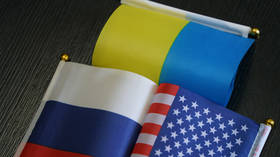Slaughterhouse for cashmere goats as crisis hits Mongolia
Many cashmere wool farmers in Mongolia have been forced to sell or slaughter their precious goats as profits have been sheared because the demand for luxury goods has plummeted during the financial crisis.
Many Mongolian nomad farmers used to earn most of their income raising goats which produce the soft fibers that are used to make the high-end cashmere sweaters, scarves and coats. Yet the world economic crisis has changed everything, even hitting the most remote parts of the world.
Mongolian nomad farmer Terychin Chengelbator has been living on the Mongolian plains all his life, raising goats for cashmere. Now he is simply struggling to survive.
“I'm not getting even the half of the money I used to get,” says Terychin who decided last year to increase his livestock and even took out a bank loan.
With the current global financial meltdown he is unable to pay the loan back. Terychin says that “the only choice for me now is to sell my precious wool goats for meat. It's a real shame.”
Before the world plunged into the credit crisis, Mongolian herders used to get up to $85 for every kilogram of wool they gave to manufacturers. In Europe and America, cashmere products have always been prized, sold all around the world and gracing the fashion houses of the rich.
With current demand rapidly falling globally, Mongolians are lucky to get $15 to $20 per kilo. This is bad news for Mongolia as it is the largest exporter of cashmere in the world. In addition, if farmers are selling their herds of prized cashmere goats for meat and if numbers decrease low enough, it might take years of hard work to restore the entire industry.
“For the last year demand for wool products has fallen dramatically. We simply could no longer afford to buy raw cashmere from farmers at the same price. We also have to cut down on production. But at the same time we try to increase the quality,” says the Chief Operating Officer of GOBI, a major Mongolian manufacturer of cashmere, Dorond Naranbaatar.
Mongolians call the current situation a financial “Zud”, a local term for unusually harsh winters that devastate herds. Financial analysts forecast that this Zud that was born on Wall Street could last longer than just one season.












